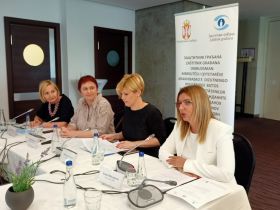El Defensor del Pueblo acude a Melilla
Date of article: 19/07/2022
Daily News of: 19/07/2022
Country:  Spain
Spain
Author:
Article language: es
El Defensor del Pueblo, Ángel Gabilondo, acude hoy a Melilla para conocer in situ el testimonio de las autoridades de la Ciudad Autónoma, de las Fuerzas y Cuerpos de Seguridad del Estado, de las entidades que trabajan en la zona y de quienes accedieron a territorio español -ahora en el Centro de Estancia Temporal de Inmigrantes (CETI)- sobre los trágicos sucesos acaecidos el 24 de junio en el perímetro fronterizo de Melilla.
El Defensor tiene previsto reunirse con el presidente de la Ciudad Autónoma de Melilla, Eduardo de Castro, y con la delegada del Gobierno en Melilla, Sabrina Moh. Además, Ángel Gabilondo mantendrá encuentros con los mandos de las Fuerzas y Cuerpos de Seguridad del Estado y con entidades que operan en la Ciudad Autónoma.
El 24 de junio, cerca de 2.000 personas intentaron pasar irregularmente a territorio español. En este suceso fallecieron decenas de migrantes -el número no ha sido aún precisado- en territorio marroquí. Y hubo más de 300 heridos -agentes españoles y marroquíes y migrantes-.
Ese mismo día el Defensor del Pueblo lamentó expresamente la pérdida de vidas humanas, se puso en contacto telefónico con la delegada del Gobierno en Melilla, y con la directora general de la Guardia Civil para interesarse por lo sucedido y por las víctimas y heridos. También telefoneó al presidente de la Ciudad Autónoma. El Defensor preguntó por el estado de las personas que llegaron a territorio español -cómo se habían aplicado los protocolos en el CETI de Melilla y la asistencia letrada recibida- además de por la situación de los miembros de las Fuerzas y Cuerpos de Seguridad del Estado que resultaron heridos.
La queja dio lugar a distintas actuaciones y solicitudes de información ante organismos administrativos: Ministerio del Interior (Secretaría de Estado de Seguridad) y Ministerio de Inclusión (Dirección General de Atención Humanitaria), a fin de supervisar, como corresponde al Defensor del Pueblo, la actividad de la Administración.
La actuación está abierta y habrá de completarse con la información recibida de las administraciones y la que se recabe tras los encuentros mantenidos en Melilla.
El Defensor del Pueblo acude a Melilla acompañado por la adjunta segunda, Patricia Bárcena, y por un equipo técnico de la institución.




